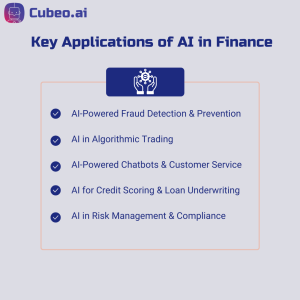Artificial Intelligence is revolutionizing the financial sector, driving efficiency, reducing risks, and improving customer experiences. From fraud detection to automated trading, AI is reshaping how financial institutions operate. In this blog, we’ll explore AI in finance, its real-world applications, benefits, and future impact.
Table Of Contents
The Role of AI in Finance
AI is now a critical tool in banking, investment, risk management, and compliance. Financial institutions are leveraging machine learning (ML), natural language processing (NLP), and predictive analytics to automate processes and make data-driven decisions.
Key Applications of AI in Finance
1. AI-Powered Fraud Detection & Prevention
Financial fraud is a growing concern, with cybercriminals using advanced techniques to exploit vulnerabilities. AI-driven fraud detection systems analyze vast amounts of transaction data in real time, flagging suspicious activities before they cause damage.
Example: Mastercard uses AI to detect fraudulent transactions by analyzing spending behaviors and identifying anomalies.
Learn more about AI in fraud detection (IBM AI in Finance)
2. AI in Algorithmic Trading
AI-driven algorithmic trading uses predictive analytics and deep learning models to execute trades at optimal prices. These systems analyze market trends, economic indicators, and investor sentiments to make split-second trading decisions.
Example: JPMorgan Chase employs AI for market trend prediction, significantly enhancing trading efficiency.
Explore AI in financial markets (Deloitte AI in Finance)
3. AI-Powered Chatbots & Customer Service
AI chatbots and virtual assistants enhance customer support by providing 24/7 assistance, answering queries, and personalizing banking experiences. NLP enables chatbots to understand and process complex financial inquiries.
Example: Bank of America’s Erica chatbot handles customer inquiries, account management, and financial planning.
Discover AI-driven customer service in banking (Cloud AI in Finance)
4. AI for Credit Scoring & Loan Underwriting
Traditional credit scoring relies on historical data, often missing critical indicators of creditworthiness. AI-powered underwriting models analyze alternative data sources, including social media behavior and spending patterns, to provide more accurate and fair credit assessments.
Example: Upstart, an AI-driven lending platform, reduces bias in credit scoring by considering non-traditional data points.
Read more about AI in risk assessment (OECD AI in Digital Finance)
5. AI in Risk Management & Compliance
AI helps financial institutions detect compliance violations and mitigate risks by analyzing regulatory frameworks and monitoring transactions for suspicious activities. Machine learning models predict financial risks based on historical data, helping banks and insurers make proactive decisions.
Example: HSBC uses AI for anti-money laundering (AML) compliance, reducing false positives in transaction monitoring.
AI’s role in compliance (Deloitte AI in Financial Services)

The Benefits of AI in Finance
Increased Efficiency & Cost Savings
- AI automates manual processes, reducing operational costs and improving turnaround times.
Enhanced Decision-Making
- AI provides real-time insights, enabling financial institutions to make more accurate predictions and strategic decisions.
Strengthened Security
- AI-powered fraud detection and cybersecurity solutions help protect sensitive financial data from cyber threats.
Personalized Financial Services
- AI tailors financial products and services to individual customer needs, enhancing user experiences.

Challenges & Ethical Considerations
Despite its benefits, AI in finance poses challenges, including:
- Bias in AI algorithms – AI models can inherit biases from training data, leading to unfair lending decisions.
- Data privacy concerns – AI systems handle vast amounts of personal financial data, raising privacy and security issues.
- Regulatory uncertainty – Governments are still working on clear AI regulations for the financial sector.
How Cubeo AI Empowers Financial Teams with AI-Powered Automation
With AI revolutionizing finance, businesses must adopt custom AI-driven solutions to stay competitive. Cubeo AI enables financial teams to:
- Automate repetitive financial processes, such as data entry, compliance monitoring, and customer support.
- Build AI-powered financial assistants that provide real-time insights and recommendations.
- Leverage AI-driven risk assessment models for smarter investment and credit decisions.
🚀 Want to transform your financial workflows with AI? Try Cubeo AI today!
Future Trends in AI and Finance
AI’s role in finance will continue to expand in 2025 and beyond, with trends like:
- Decentralized Finance (DeFi) & AI – AI-powered DeFi platforms will automate smart contracts and crypto transactions.
- AI-Powered Predictive Analytics – AI will provide real-time financial forecasting, enhancing decision-making for investors.
- AI-Driven Personalized Banking – Banks will use AI to create hyper-personalized financial experiences based on user behavior.

Final Thoughts
AI is transforming finance, making processes faster, smarter, and more secure. From fraud detection to algorithmic trading, AI is helping financial institutions optimize operations and deliver personalized, data-driven services.
Businesses that embrace AI in finance today will gain a competitive edge in the rapidly evolving financial landscape.
📢 Don’t get left behind—explore AI-driven financial automation with Cubeo AI!



